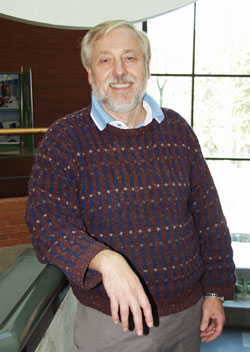
| Daily News | News Releases | Special Bulletins | Feature Archives |
| The View from Trent | Trent Magazine | Focus Trent | Build 2000 |
Rabies Research Grant goes to Prof. Brad White
 Dr.
Bradley White, Trent professor and researcher, will lead an important
research program on how raccoon rabies is spreading in Ontario and other
parts of North America. Using DNA profiles of raccoons, Dr. White will
determine the origin of affected animals, as well as the virus.
Dr.
Bradley White, Trent professor and researcher, will lead an important
research program on how raccoon rabies is spreading in Ontario and other
parts of North America. Using DNA profiles of raccoons, Dr. White will
determine the origin of affected animals, as well as the virus.
A prestigious raccoon rabies research grant has been awarded for this project, which involves an international collaboration of governments, universities and the private sector. A major partner is the Ontario Ministry of Natural Resources (OMNR), which is a world leader in the management of rabies.
"Raccoon rabies first appeared, in Ontario, in 1999 and there have now been over 100 cases in the province," explains Dr. White. "The concern is with the potential of the infection spreading to city populations of raccoons and, for the last few years, there has been a significant OMNR program underway to limit the spread of the disease from eastern Ontario."
The cases have primarily surfaced in the Wolfe Island/Brockville area. Infected raccoons from the U.S.A. appear to have crossed the St. Lawrence River and made their way onto Canadian soil. Some infected animals may have arrived in Canada as stow-aways on American trucks and transports.
"As soon as a positive (case) is identified, the OMNR sends trappers to depopulate the area and have those animals tested. They then trap, vaccinate and release animals in the area and finally fly over the area and drop baits with vaccines around the perimeter to contain the infection," says Dr. White. "We will be typing the virus and the raccoons to track how the virus is moving. This information will be used by OMNR to implement the most efficient and cost-effective control measures."
A research associate involved in this project recently returned from a North Bay Fur House with 3,000 raccoon samples from across North America. These samples will be DNA profiled to determine the structure of raccoon populations, allowing the origin of infected and hitch hiking raccoons to be determined.
"Basically, rabies is a lethal disease," says Dr. White. "From the wound site, it travels up the nerves to the spinal column and to the brain. There is a very small window of opportunity to use antibodies after a bite to prevent the disease."
The grant awarded to Dr. White, and his team, is a four-year, $815,000 grant from the Natural Sciences and Engineering Research Council of Canada. It is a coveted prize throughout the nation’s scientific community.
The OMNR rabies unit is located at Trent University and Dr. White will be working closely with them on this project. He is well known for his DNA research and expertise, and is a world leader in the field of population genetics.
Click here for News Release
Posted December 4, 2002
![]() Return to Trent Home
Return to Trent Home
Maintained by the Communications
Office
Last updated
January 17, 2003